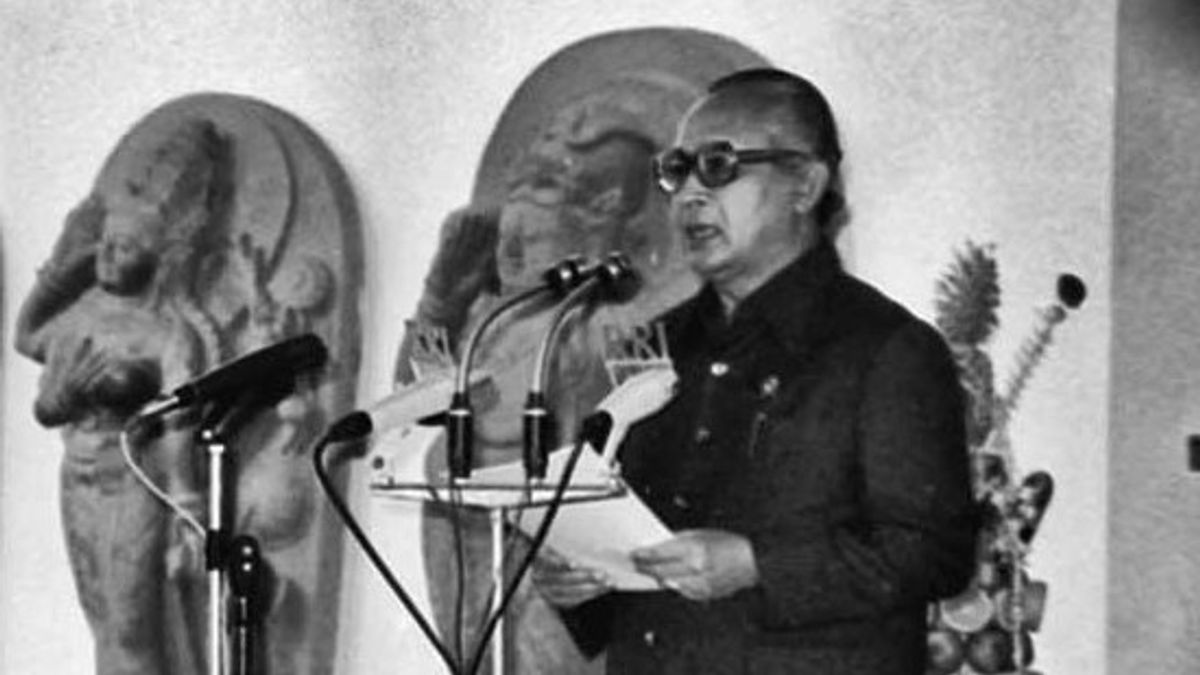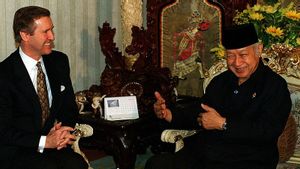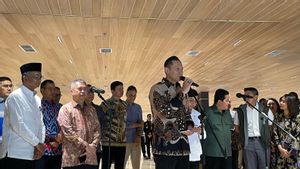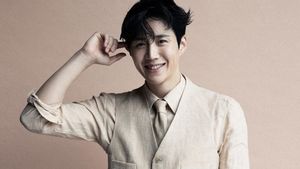JAKARTA - Suharto did not only practice the politics of 'hitting' in the New Order. He also embraces. Everything for control. Including Muslims. The establishment of the Indonesian Ulema Council (MUI) is one way.
The New Order's intervention in the establishment of the MUI made the assembly easy to steer. MUI only works for the benefit of the government. While religious interests later. MUI is opposed by many parties. At its peak, MUI was branded as a mere religious 'stamp'. No more.
Since the first, Muslims have been known as a great power in the archipelago. The Dutch colonialists, then the Japanese were most careful when dealing with Muslims. Once perpetuating policies that harm Muslims, echoes of rebellion broke out everywhere.
Islamic religious leaders, especially those with Hajj titles, have become leaders of resistance in various parts of the country. This series of resistance made the Dutch lose money, and even almost went bankrupt. Suharto understood that. He experienced the great influence of Islam in Java.
As a child, Suharto was educated as a religious child. In the afternoon, Suharto diligently recited the Koran and did not forget to perform the five daily prayers. Suharto grew up in an Islamic environment. Even when he served as the number one person in Indonesia.
Suharto did not deny the strength of the majority of the Indonesian population who are Muslim. He then chose to be careful in acting with the people. Suharto realized that Islam was politically strong. He then tried to embrace the Muslims.
"Looking at the state of society when Prophet Muhammad SAW, was born, his birthday implies renewal and improvement for society, humans with the teachings of Islam, from the role models of faith and piety of Prophet Muhammad SAW" The important wisdom is used in the struggle of the new order now, apart from the intercession of Muslims and human problems among God's creatures."
"This is simplicity, always prioritizing the public interest over personal interests, and tolerance in carrying out religious orders," said Suharto when filling the speech for the birthday of the Prophet Muhammad SAW at the Hotel Duta Indonesia, June 19, 1967.
Embrace Muslims
In the middle of the road, the desire to embrace began to turn into controlling Muslims. The emergence of voices of Muslims who want to build Islamic conceptions in the country is the estuary. Moreover, the desire to apply Islam as the basis of the state according to the Jakarta Charter is strengthening.
Don't want to be confused. The New Order government began to try to control Muslims in various ways. Suharto felt the need to establish an inter-religious clerical institution or forum. Weakening the footprint of the Islamic party was used as an option by Suharto.
He urged the four political parties that exist in the country to remove the term Islam from their parties. The four parties include Nahdlatul Ulama (NU), the Indonesian Muslim Party (Parmusi), the Indonesian Islamic Syarikat Party (PSII), and the Tarbiyah Islamiyah Association (Perti).
After that, the four parties were merged into one lasting party known as the United Development Party (PPP). All of this is for the sake of perpetuating the New Order's desire in order to politically tame Muslims.
“Until the end of the 1970s Muslims were forced to make compromises and be defensive against the government's attitude, not only their interests were blocked, but also politically, they did not get an adequate place in the power structure – even though at that time Muslims were a group of people. majority in Indonesia,” said FX Baskara Tulus Wardaya in his book Uncovering the Mysteries of Suharto's Power (2007).
MUI was born and opposedThe New Order narrative made the forum for controlling Muslims even more massive in the 1970s. The New Order began to intervene in organizing conferences involving ulama. the government even totally supported the conference – from giving encouragement to directing the conference. In order to give birth to an Islamic religious institution, he said.
Suharto himself came down the mountain to urge the birth of a religious institution. The 32-year-old general conveyed his insistence on the importance of religious institutions on two occasions.
Suharto expressed his intention when giving a closing remarks at the Workshop for Indonesian Muslim preachers in Jakarta on 26-29 November 1974. After that, Suharto also reiterated his intentions when he received the management of the Indonesian Mosque Council at the State Palace, 24 May 1975.
As a result, Suharto's insistence was followed up by the Ministry of Home Affairs (Kemendagri). The Ministry of Home Affairs then instructed that each region that does not yet have a clerical assembly to form a cleric assemblies.
That wish came true. Since 1974-1975 assemblies of ulama at the first and second levels have sprung up. After completion, the Indonesian Ulema Council (MUI) at the national level officially appeared on the political map of the country in 1975.
“The birth of the MUI itself began with the formation of a preparatory committee for the I National Conference of Ulamas throughout Indonesia with the Decree of the Minister of Religion (Menag) No. 28 dated July 1, 1975 chaired by Lt. Gen. (Ret.) H. Soediman with three advisors, namely Prof. Hamka, KH. Abdullah Syafi'i, and KH Syukri Ghozali. Deliberations were held with the intention of establishing a MUI at the central level as a continuation of the formation of MUIs in the regions.”
"Finally, at the VIII Plenary Session at the deliberation forum, it was agreed that the MUI at the national level was established, right on Saturday, July 26, 1975. The charter of its declaration of establishment was signed by 53 scholars from all over Indonesia and Buya Hamka was elected as the first general chairman," explained Fawaizul Umam in the book. When Religion Is No Longer Free: The Indonesian Ulema Council in Practical Religious Freedom (2015).
The election of Buya Hamka was not without reason. Buya Hamka at that time had the status of a famous cleric in Southeast Asia. Therefore, Buya Hamka's capacity is considered appropriate to lead the MUI. Buya Hamka's reasons for wanting to lead were, among other things, so that Muslims could cooperate with Sukarno in eradicating communism. Because of that, MUI can be a kind of forum that can be a mouthpiece for Muslims to the government.

However, the presence of MUI actually received opposition from all Muslims. The formation of the MUI is considered without going through an in-depth deliberation process involving all Islamic organizations. Many Muslims feel that their interests are not represented by the MUI. Moreover, MUI is often touted as a religious “stamp” for every secular government program, activity, and policy.
However, the condition was much reduced when Suharto stepped down in 1998. MUI seemed to be reborn. The MUI has fought for many matters of religious interest. Even though the criticism of the MUI is not independent, it often emerges.
“The New Order formed other institutions to control and direct Islam. One of the most important of these was the Indonesian Ulema Council (MUI), which was founded in 1975. At the time, it was intended as a vehicle for the government to direct Islam and, in some Islamic circles, it was stigmatized for this reason.”
“It was only after the fall of Suharto that MUI became a forum to fight for the interests of Islam – especially from the most conservative groups, Islamists and Da'wahis – in front of the government. Although initially criticizing the idea of forming an assembly like this, Hamka accepted when he was appointed its first chairman, but then resigned in 1981 as a protest against the lack of independence of the MUI in front of the government,” MC Ricklefs in his book Islamizing Java (2013).
*Read other information about NUSANTARA HISTORY or read other interesting articles from Detha Arya Tifada.
Other MEMORIESThe English, Chinese, Japanese, Arabic, and French versions are automatically generated by the AI. So there may still be inaccuracies in translating, please always see Indonesian as our main language. (system supported by DigitalSiber.id)









